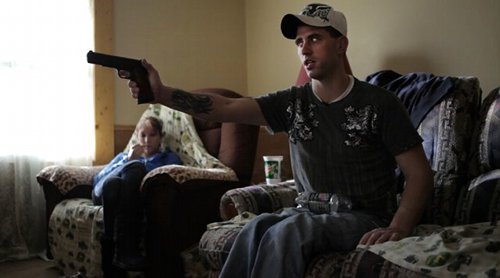Similar to last year’s Restrepo, this year’s Academy Award nominee for Best Documentary, Hell and Back Again, looks at the trials and tribulation within the U.S. conflict in Afghanistan, centering, for the most part, on the rhetoric of our politicking. Various commanders sit down with Afghan elders and explain that “we’ll pay for [the damage we’ve created],” while soldiers lament to their comrades, “I could never live like that” in “mud homes with straw roofs with nothing to do but farm.” The biggest issue raised here is the misunderstanding of cultures, or rather, our ignorant ideals about what people should be embracing. These moments are mordantly snicker-worthy and, once again, beg the question: why are we there? And, do the Afghans want us there?
The answers here, and with many war-based films, are “we’re not sure,” and “no.”
In contrast to Restrepo, there is a secondary element at work: the effects of war on the returning, injured veteran. The majority of the film centers on Sergeant Nathan Harris, a Marine charged with leading Echo Company’s 2nd Platoon “the farthest South” into the most treacherous depths of Afghanistan during the Surge of 2009. Already prefaced as the company that is “going to change history,” the Marines are hungry and embrace their expertise “in the application of violence,” something that requires a commanding officer’s repeated assertion that “your conscience should be clear.”
In these scenes, Hell and Back Again seems like a non-fiction version of Full Metal Jacket in which R. Lee Ermey’s assertion that “if you ladies leave my island, if you survive recruit training, you will be a weapon. You will be a minister of death praying for war,” likens their ultimate actions, inflicted violence, and death as a divine mandate.
Similarly in both, there are also moments where the decisions are binary. There is an illusion of choice created, but the Marines really only have one option. In Full Metal Jacket, if they choose not to fight, they upset the “Virgin Mary” and God, who “has a hard-on for Marines because we kill everything we see.” In Hell and Back Again, this rhetoric is effused via the threat of shame: “They’re going to ask what you did in the Summer of Decision.” While “they” are friends and family at home, “they” are also other soldiers. A response of “nothing” or “hid my head” would defy both the role “of experts in the application of violence,” but also the title of “hero” or “Marine.” Similarly, titling the Surge with a moniker that bespeaks a great movement makes it virtually impossible for a soldier to reject the cause. In other words, “The Summer of Decision” asks “Did you decide to fight with us, or against us?”
The largest toll is taken on those returning home. While necessary in combat, this endemic trait of violence causes the severely injured Harris to be “constantly stressed out” in his everyday life in the States. A trip to Wal Mart is wrought with difficulties making decisions and maneuvering around the store in his motorized chair. A subsequently difficult journey through a fast-food drive thru prompts him to lament, “I would almost rather be in Afghanistan.”
The agony through which Harris crawls is not solely brought on by his weeks in training. It seems that his relegation to “dependent” has a greater impact on his psyche. In Afghanistan, he led men into battle. He made decisions. He gave orders, and he was successful. Upon returning home, his tools are replaced by a bag replete with prescription pills, physical therapy, and an evolution of mobility-aiding instruments: a motorized scooter, two crutches, a single crutch, and a cane. Even though the movie depicts impressive physical improvement in a man whose hip and femur were shattered, he realizes that he’ll never be a leader again – at least, not in the capacity he’s used to.

What’s more, when Harris returns home or attends a Marine gathering, the focus of the conversation is about his injury and how it happened. Visibly, Harris has become a target of sympathy and inquiry, but not about his actions in the war; rather, most questions are about his injury. Such a sudden erasure of authority and the subsequent relegation to “injured vet” encourages a reconnection with “violence,” a word that has become synonymous with “purpose.” As Harris lays in bed next to his wife, Ashley, he explains how much he “just loves his pistol,” and his desire “to hold it and caress it,” a rather simple chore in that he keeps the pistol butt flush with the edge of his mattress. Shortly after, he notes that he doesn’t want to “point it at anyone,” but this sentiment becomes more difficult to believe as the movie spirals into the third act: Harris’s eyes grow increasingly blank and vacuous like those of a shark searching for a meal; the number of pills taken increases, but his pain never seems to subside; his head often finds its way into the palm of his hand in an attempt to block out the world and survive the various Wal Mart of Sonic road trips.
The most powerful element of Hell and Back Again is not the violence or U.S. policy: it’s the examination of what happens when someone is relegated to living a life without the same sense of purpose and meaning that they had just a few months prior.






